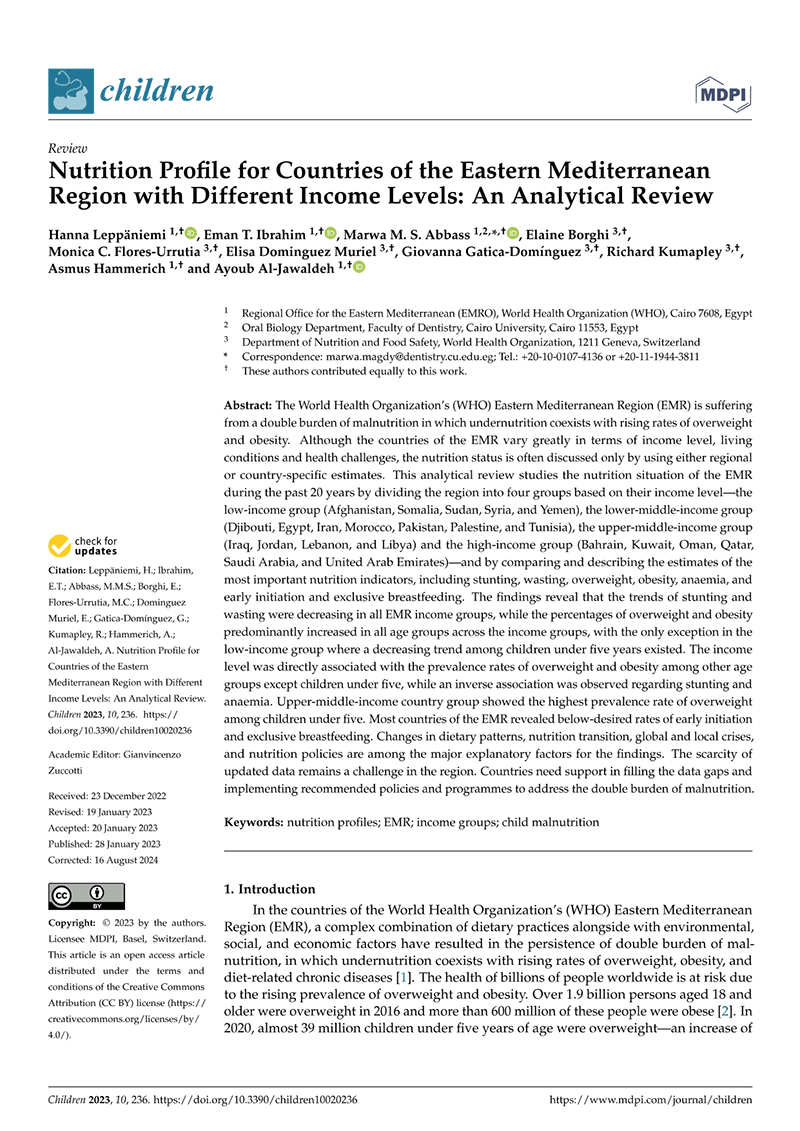
Nutrition profile for countries of the Eastern Mediterranean Region with different income levels: an analytical review
Publication date: 2023
A recent analytical review of the WHO's EMR reveals a persistent double burden of malnutrition, with undernutrition coexisting with increasing overweight and obesity rates. The review, which divides EMR countries into four income groups, examines trends in key nutrition indicators over the past 20 years, including stunting, wasting, overweight, obesity, anemia, and breastfeeding practices. Findings indicate a decrease in stunting and wasting across all income groups, but a rise in overweight and obesity in most age groups. The review emphasizes the need to address data scarcity and support countries in implementing effective policies and programs to combat the double burden of malnutrition in the EMR.

Food consumption and adherence to dietary guidelines among Jordanian children and adolescents
Publication date: 2023
Early-life food consumption patterns may affect children’s health by increasing susceptibility to developing non-communicable chronic diseases (NCDs) in adulthood. It aims to evaluate Jordanian children and adolescents’ energy and macronutrient intake and how closely they adhere to dietary recommendations. In conclusion the food consumption of Jordanian children and adolescents includes high intakes of discretionary calories, with a low intake of fruits, vegetables, and dairy products. The prevalence of overweight/obesity was elevated compared to international norms.

Nutrition situation analysis in the UAE: a review study
Publication date: 2023
This study highlights the gaps and challenges that prevail in addressing nutrition-related problems and the opportunities that have been overlooked. The study indicates that the UAE faces multiple nutrition-related problems, including being underweight, overweight, obesity, micronutrient deficiencies, and nutrition-related chronic diseases. The UAE has a high prevalence of obesity and diabetes, but limited studies have documented this nutritional phenomenon. The review emphasizes the urgent need to assess the population’s nutrient behaviors to aid policy decision-makers in developing and implementing effective health policies and strategies.

Reshaping food systems to improve nutrition and health in the Eastern Mediterranean Region
Publication date: 2023
This detailed and comprehensive study examines nutrition and health in the WHO EMR, presenting the six game-changing food systems actions proposed by the WHO and the progress of their implementation in the region. WHO EMR is a particularly complex place to study: an area of economic contrasts with changing dietary patterns and stark differences between high levels of malnutrition and a prevalence of overweight and obesity. As a result, actions to improve the nutritional situation of the population are urgently sought. The strategies explored in this book offer a unique opportunity to change food systems worldwide, addressing aspects including sustainable food production, the impact of marketing and labelling on behaviour, and the effect of global events such as climate change, war and the COVID-19 pandemic.

National protocol for the fourth round of assessment of food consumption pattern, nutrients intake and food security in Iran, development, design, and implementation
Publication date: 2022
This report details the design and implementation of Iran's fourth national food consumption survey. The survey, crucial for shaping food and nutrition policies, used multi-stage cluster sampling across 31 provinces. It gathered data on food intake through a two-day recall method, capturing seasonal variations. The data were analyzed to report average consumption across different socio-economic groups and urban/rural areas. These surveys help policymakers assess food security and create strategies for promoting healthier diets in Iran.
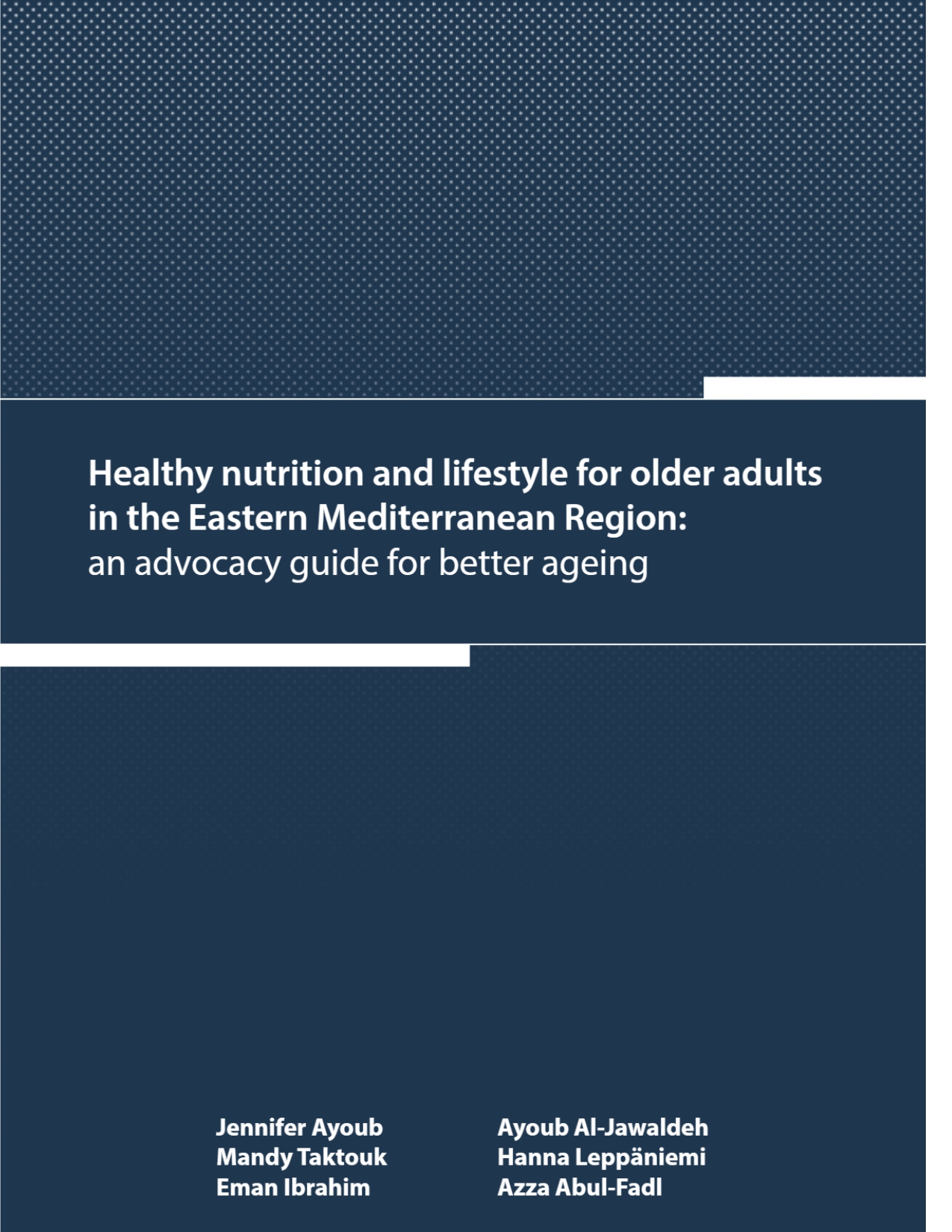
Prevalence and antibiotic resistance of staphylococcus aureus and escherichia coli isolated from bovine raw milk in Lebanon: a study on antibiotic usage, antibiotic residues, and assessment of human health risk using the one health approach
Publication date: 2022
In Lebanon, the consumption of raw bovine milk has been recently reported as a result of the financial crisis. The objectives of this study were (1) to evaluate raw bovine milk samples comprehensively for the types of antibiotics used and their residues; (2) to determine the presence of mesophilic bacteria, extended-spectrum β-lactamase -producing Escherichia coli and methicillin-resistant Staphylococcus aureus; and (3) to determine the associated human health risk caused by drinking raw milk with antibiotic residues among all age categories.

Jordan’s population-based food consumption survey: protocol for design and development
Publication date: 2023
This cross-sectional study is the first study focusing on Jordanians’ food consumption patterns at various ages. This study aims to describe the design and methodology of Jordan’s Population-based Food Consumption Survey (2021-2022). To conclude, the survey data will serve as a solid nutritional background for future studies, help assess dietary patterns changes, develop and evaluate nutrition policies, and serve as a solid foundation for developing a future national surveillance system on food consumption patterns.

Association of household food insecurity with dietary intakes and nutrition-related knowledge, attitudes, and practices among parents, aged ≥ 18 years in Gaza strip, Palestine: A descriptive study
Publication date: 2022
The purpose of this study was to examine the association between household food insecurity and dietary intake and nutrition-related knowledge, attitudes, and practices (KAP) among parents aged ≥18 years in the Gaza Strip, Palestine. This study concludes that demographic and socioeconomic status, anthropometric measurements, and poor dietary intakes may be associated with high levels of household food insecurity, while having nutrition-related adequate KAP may be associated with low levels of household food insecurity among parents aged ≥18 years.
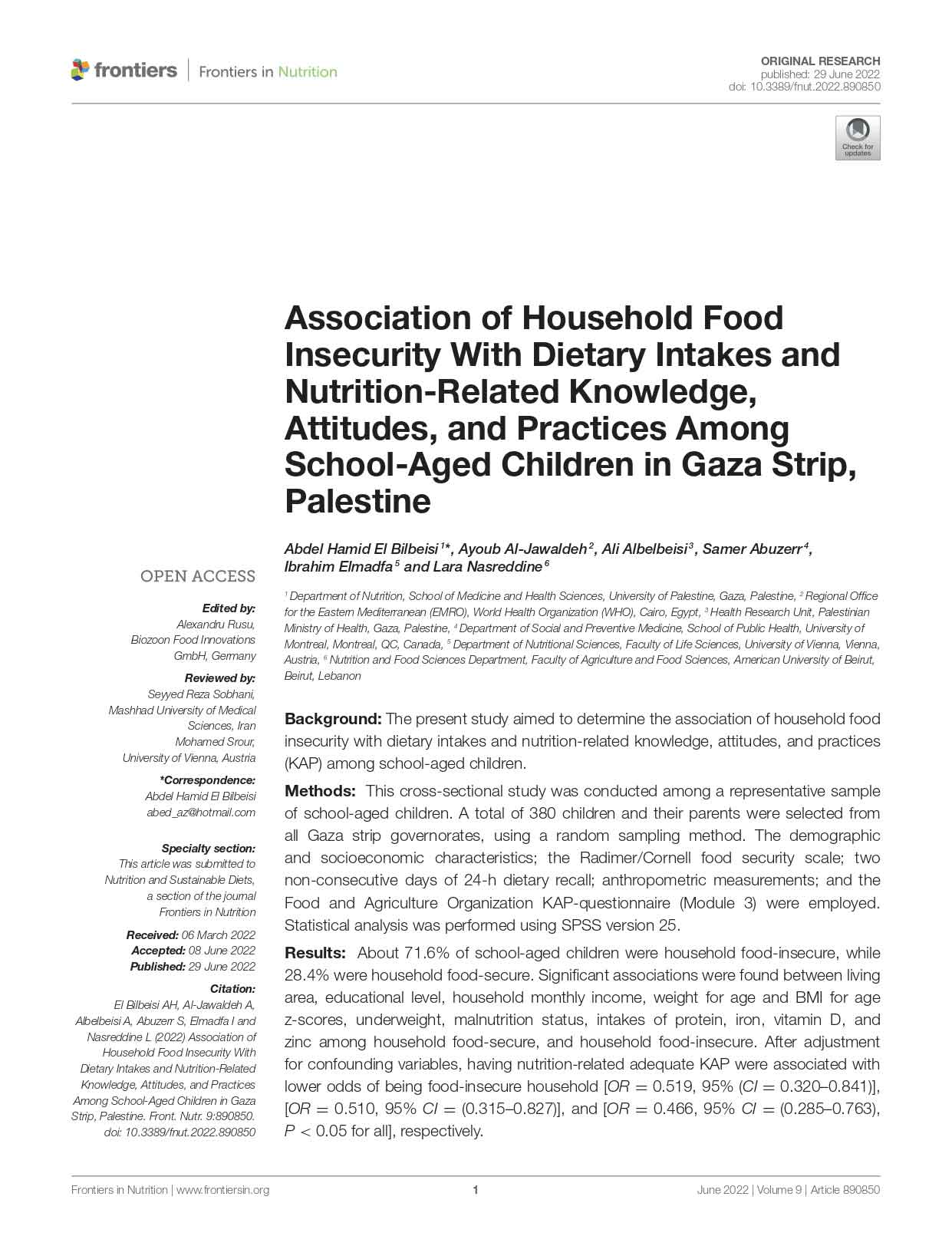
Association of household food insecurity with dietary intakes and nutrition-related knowledge, attitudes, and practices among school-aged children in Gaza strip, Palestine
Publication date: 2022
This study aimed to determine the association of household food insecurity with dietary intakes and nutrition-related knowledge, attitudes, and practices (KAP) among school-aged children. This study concludes that low socioeconomic status, low anthropometric indices, and poor dietary intakes may be associated with a high level of food insecurity; while having nutrition-related adequate KAP may be protective against food insecurity among school-aged children.
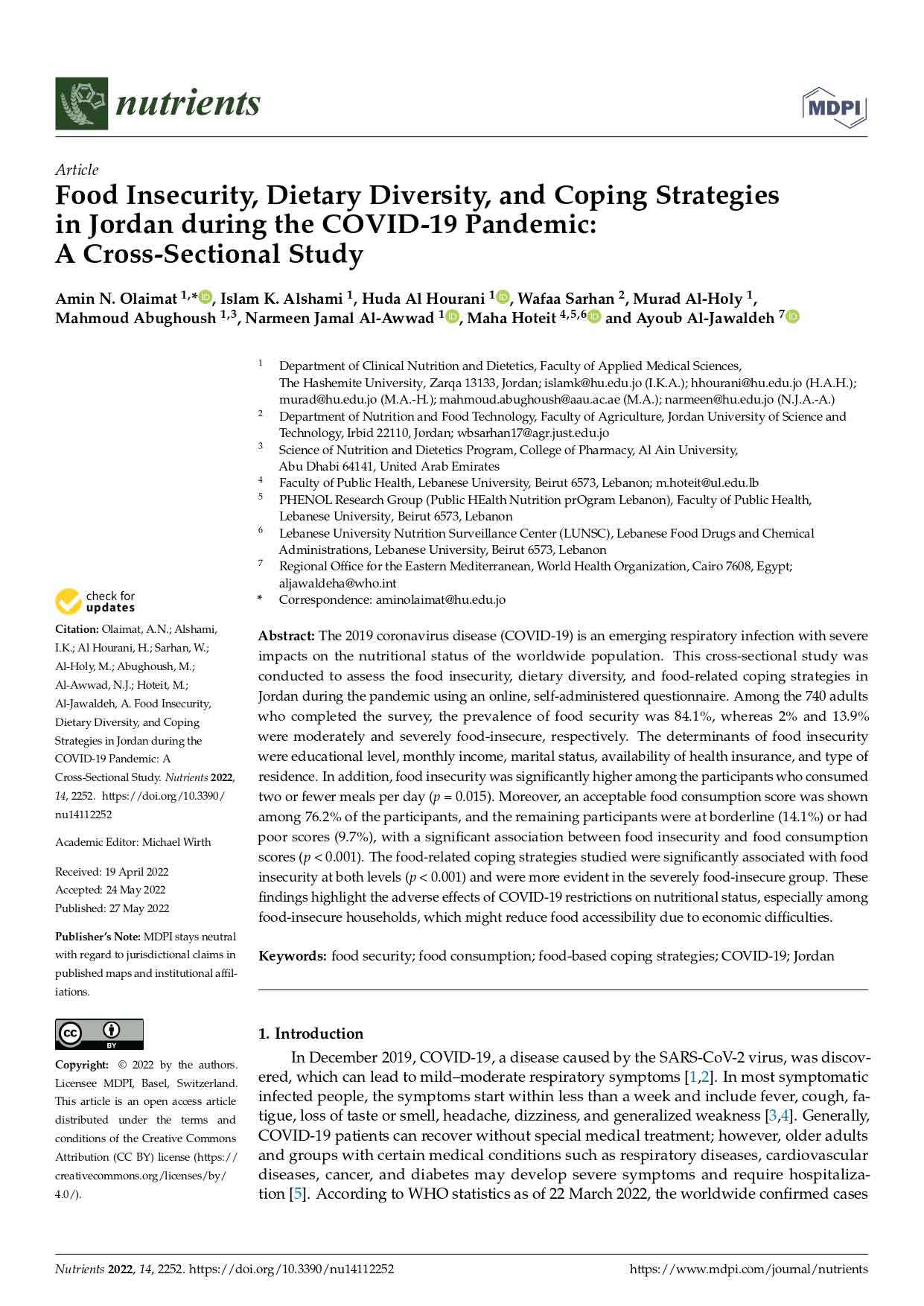
Food insecurity, dietary diversity, and coping strategies in Jordan during the covid-19 pandemic: A cross-sectional study
Publication date: 2022
The coronavirus disease (COVID-19) pandemic had a profound impact on food security and dietary habits worldwide. This cross-sectional study aims to assess the prevalence of food insecurity, dietary diversity, and food-related coping strategies in Jordan during the pandemic using an online, self-administered questionnaire. The findings highlight the adverse effects of COVID-19 restrictions on nutritional status, especially among food-insecure households, which might reduce food accessibility due to economic difficulties.
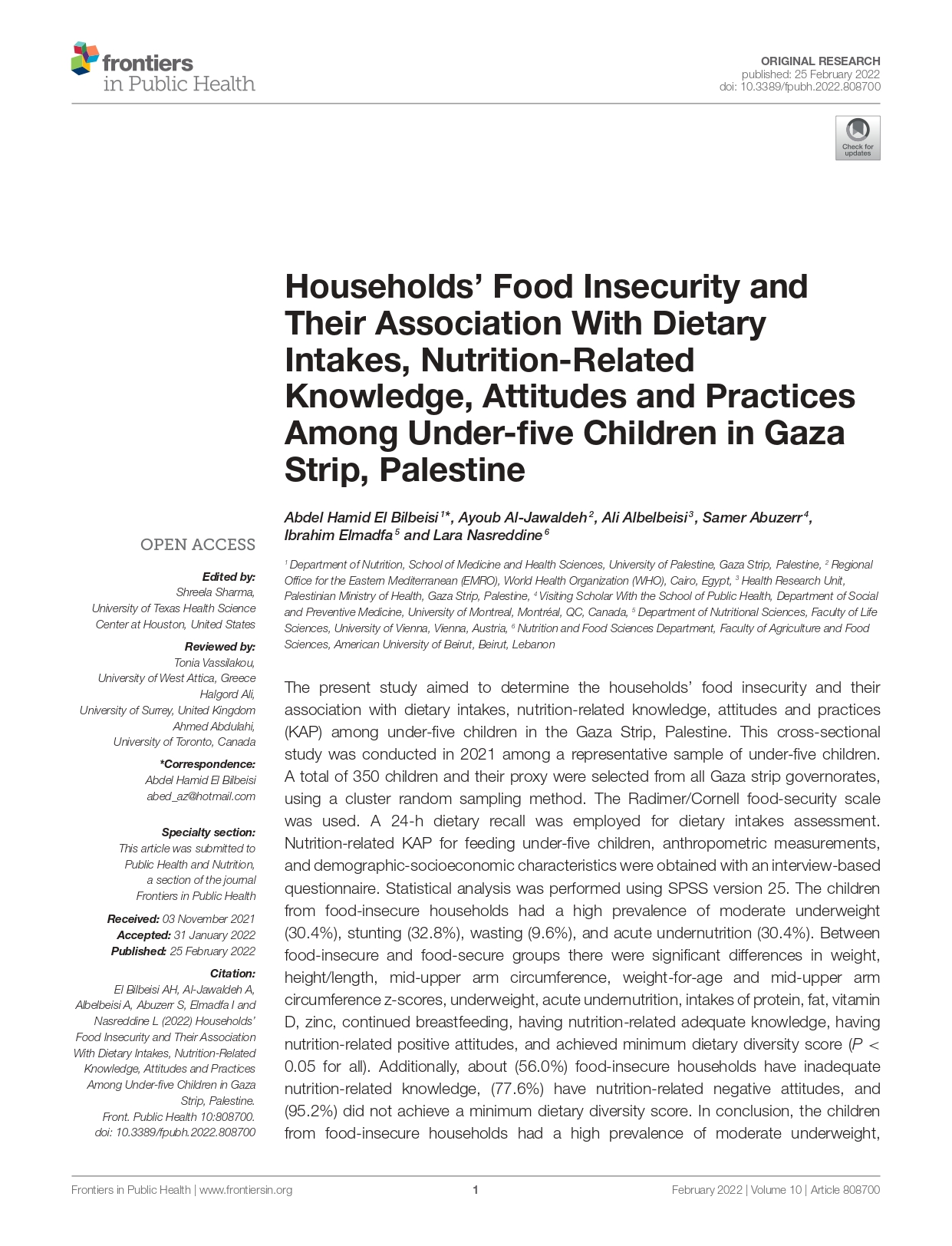
Households’ food insecurity and their association with dietary intakes, nutrition-related knowledge, attitudes and practices among under-five children in Gaza strip, Palestine
Publication date: 2022
The study aimed to determine the households' food insecurity and their association with dietary intakes, nutrition-related knowledge, attitudes and practices (KAP) among under-five children in the Gaza Strip, Palestine. To conclude, the children from food-insecure households had a high prevalence of moderate underweight, stunting, wasting, and acute undernutrition. Moreover, low economic status, poor dietary intake, low levels of nutrition-related KAP, and lack of dietary diversity could contribute to the high levels of food insecurity among under-five children.
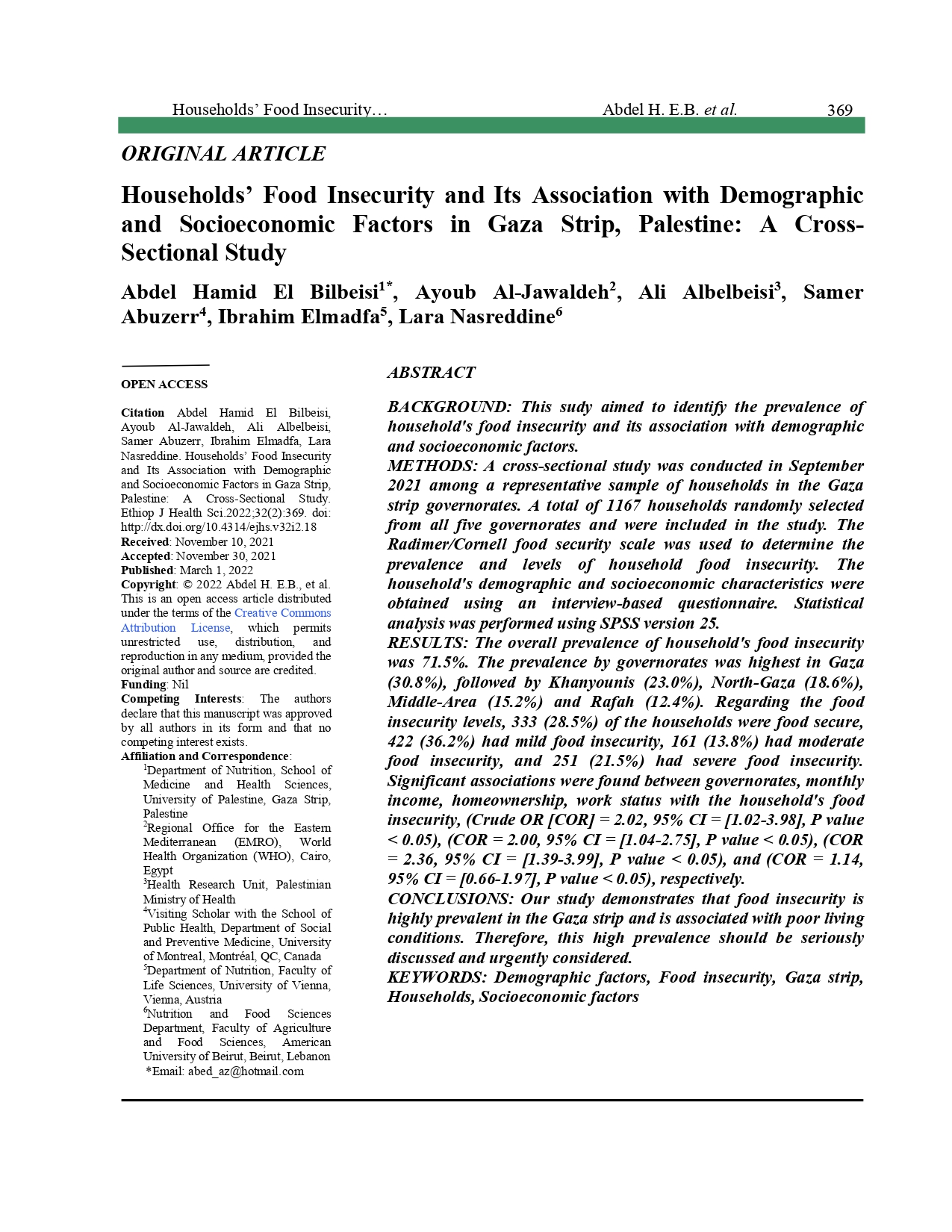
Households’ food insecurity and its association with demographic and socioeconomic factors in Gaza strip, Palestine: a cross sectional study
Publication date: 2022
This study aimed to identify the prevalence of food insecurity in households and its association with demographic and socioeconomic factors. The study concludes that food insecurity is highly prevalent in the Gaza strip and is associated with poor living conditions. Therefore, this high prevalence should be seriously discussed and urgently considered.
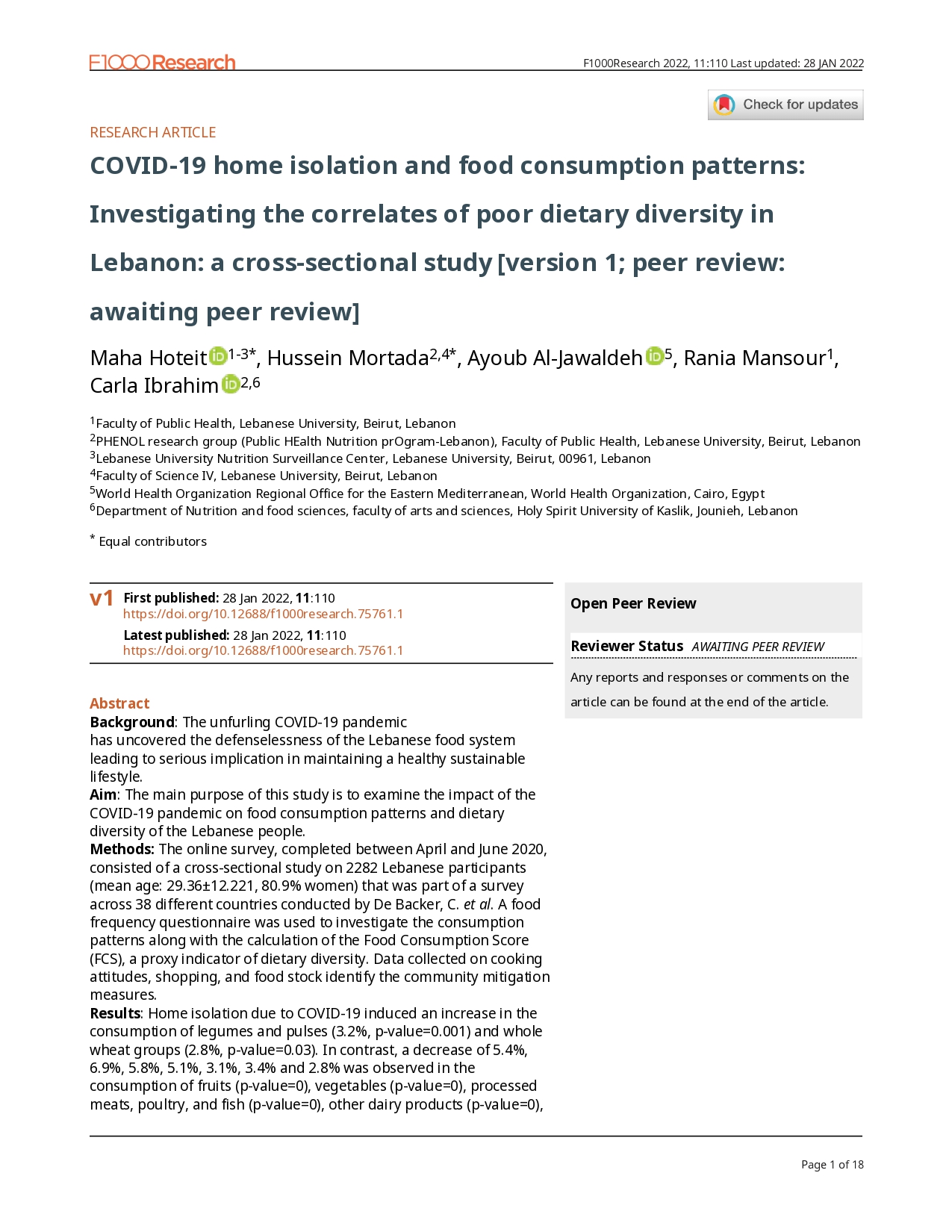
COVID-19 home isolation and food consumption patterns: Investigating the correlates of poor dietary diversity in Lebanon: a cross-sectional study
Publication date: 2022
The unfurling COVID-19 pandemic has uncovered the defenselessness of the Lebanese food system leading to a serious implication in maintaining a healthy sustainable lifestyle. The main purpose of this study is to examine the impact of the COVID-19 pandemic on food consumption patterns and dietary diversity of the Lebanese people. To conclude, the hostile home isolation strategy followed to prevent the COVID-19 spread in Lebanon, came at a high nutritional cost, driving poor dietary diversity.

Shifting to a sustainable dietary pattern in Iranian population: current evidence and future directions
Publication date: 2021
The need for a shift in diet toward a more sustainable one has reached an urgency in some countries, including Iran, due to more rapid climate change and a higher level of vulnerability. This study aims to identify and summarize available data on changes required in the current Iranian diet to make it more sustainable. It also covers the extent to which current policies in the country has addressed such a shift. The findings show that moving the Iranian diet toward sustainability will require an increase in consumption of dairy, fruits, vegetables, cereals, poultry, and legumes and a decrease in consumption of bread, rice, pasta, red meat, eggs, fats, sugars, and sweets.

Exploring the impact of crises on food security in Lebanon: results from a national cross-sectional study
Publication date: 2021
Food insecurity can cause a deleterious impact on all age groups. This study aims to explore the prevalence and correlates of food insecurity among Lebanese households since the ordeals of COVID-19, economic crisis, and Beirut port explosion. Findings show that food insecurity is an immediate problem for households in Beirut and in many governorates in Lebanon.

The state of food security and nutrition in the world 2021
Publication date: 2021
This report presents the first global assessment of food insecurity and malnutrition for 2020 and offers some indication of what hunger might look like by 2030, in a scenario further complicated by the enduring effects of the COVID-19 pandemic. It also includes new estimates of the cost and affordability of healthy diets, which provide an important link between the food security and nutrition indicators and the analysis of their trends. Altogether, the report highlights the need for a deeper reflection on how to better address the global food security and nutrition situation.

Saudi Arabia’s healthy food strategy: progress and hurdles in the 2030 road
Publication date: 2021
In response to the heavy burden of noncommunicable diseases, the Saudi Food and Drug Authority, in collaboration with other government entities, developed a healthy food strategy aimed at enhancing healthy lifestyles and reducing the intake of salt, sugar, saturated fatty acids and trans fatty acids. This manuscript contextualizes the healthy food strategy and presents the results of monitoring initiatives undertaken by the Saudi Food and Drug Authority to assess compliance with these reforms.
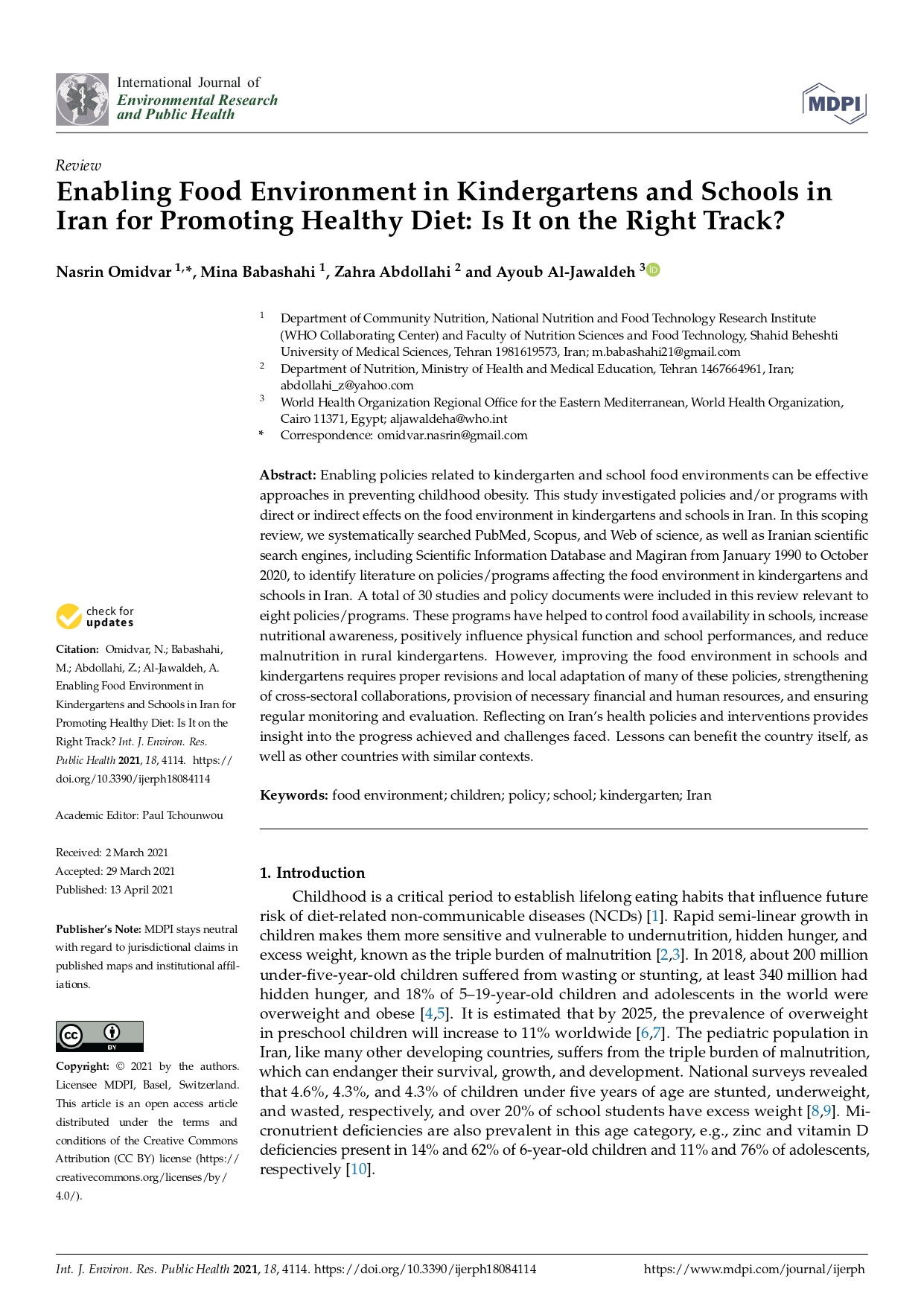
Enabling food environment in kindergartens and schools in Iran for promoting healthy diet: is it on the right track?
Publication date: 2021
Enabling policies related to kindergarten and school food environments can be effective approaches in preventing childhood obesity. This study investigated policies and/or programmes with direct or indirect effects on the food environment in kindergartens and schools in Iran. These programmes have helped to control food availability in schools, increase nutritional awareness, positively influence physical function and school performances, and reduce malnutrition in rural kindergartens. However, improving the food environment in schools and kindergartens requires proper revisions and local adaptation of many of these policies, strengthening of cross-sectoral collaborations, provision of necessary financial and human resources, and ensuring regular monitoring and evaluation.

Development of a Lebanese food exchange system based on frequently consumed Eastern Mediterranean traditional dishes and Arabic sweets
Publication date: 2021
This study aims to convert the recipes of the Lebanese traditional dishes into meal planning exchange lists whose items are expressed in grams and adjusted to Lebanese household measures (cups and spoons) that could be used by healthcare professionals. This study provides healthcare professionals, dietitians and consumers the chance to proficiently plan traditional-type dishes, ensuring prominent dietetic and medical nutritional therapy practices and patient's self-control.

Enhancing nutrition specific interventions through public health policies and public-private partnerships in the Eastern Mediterranean Region: a desk review
Publication date: 2021
Public private partnerships in public health have been widely promoted as an effective tool for accelerating progress towards achieving the United Nation’s Sustainable Development Goals, including Goal 2 “to eliminate hunger”. Partnership with the private sector was found to be instrumental in improving the nutritional status of poor and food-insecure people and promoting healthy lifestyles. The objective of this study is to assess the role and contribution of the private sector in the design/implementation of nutrition-specific interventions addressing the double burden of malnutrition in countries of the Region and identify the key factors for successful public private partnership implementation.
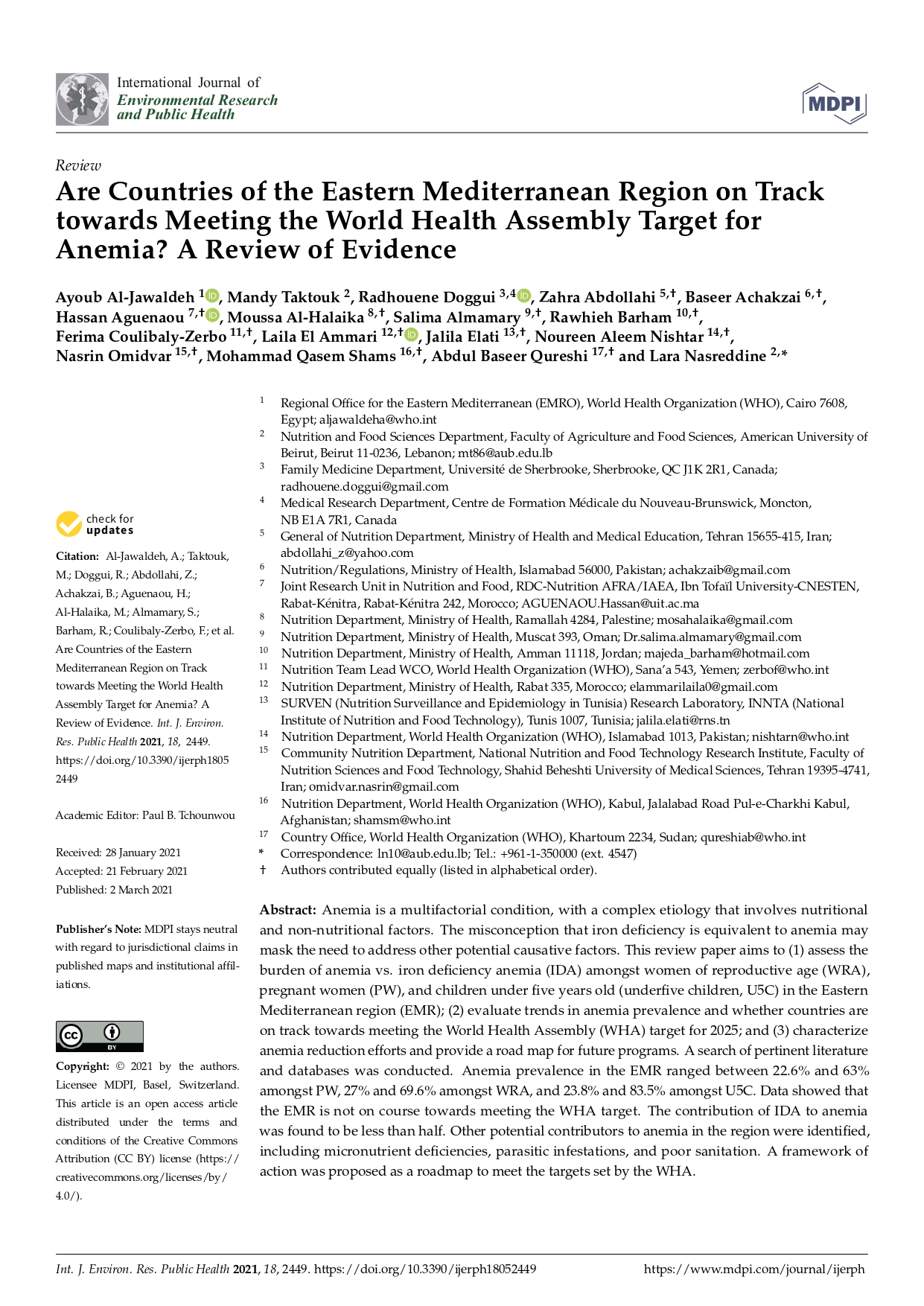
Are countries of the Eastern Mediterranean Region on track towards meeting the World Health Assembly target for anemia? A review of evidence
Publication date: 2021
Anemia is a multifactorial condition, with a complex etiology that involves nutritional and non-nutritional factors. The misconception that iron deficiency is equivalent to anemia may mask the need to address other potential causative factors. This review paper aims to: (1) assess the burden of anemia vs. iron deficiency anemia amongst women of reproductive age, pregnant women and children under five years old in the Eastern Mediterranean Region; (2) evaluate trends in anemia prevalence and whether countries are on track towards meeting the World Health Assembly target for 2025; and (3) characterize anemia reduction efforts and provide a road map for future programmes.

Understanding the complexities of prevalence of trans fat and its control in food supply in Pakistan
Publication date: 2020
Pakistan is among the nations with a high intake of trans fatty acids, a major dietary risk factor of noncommunicable diseases. This study reviews the trans fatty acids content reported in industrially-produced foods and discusses the regulatory landscape for trans fatty acids, to facilitate the required policy changes in Pakistan and ultimately eliminate the trans fatty acids burden from industrial food products. The authors recommend to: (1) promote actions toward replacement of traditional vanaspati ghee/bakery fats with healthier alternatives; (2) develop and implement best regulatory practices in line with WHO recommendations; and (3) amend food labelling laws so that clear information will be provided to inform consumers’ healthy food choices.

Leveraging the food system in the Eastern Mediterranean Region for better health and nutrition: a case study from Oman
Publication date: 2020
The adoption of a food system approach is vital for the Eastern Mediterranean Region in achieving the 2030 Agenda. The objective of this paper is to present a case-study from Oman, where a roadmap of context-specific entry points within the food system was proposed, with the overarching aim of fostering healthier diets in the population. Specific entry points within the food system were identified and a realistic roadmap of activities was outlined. Findings and recommendations presented in this paper may facilitate policy convergence efforts in Oman and serve as a case-study for other countries in the Region.
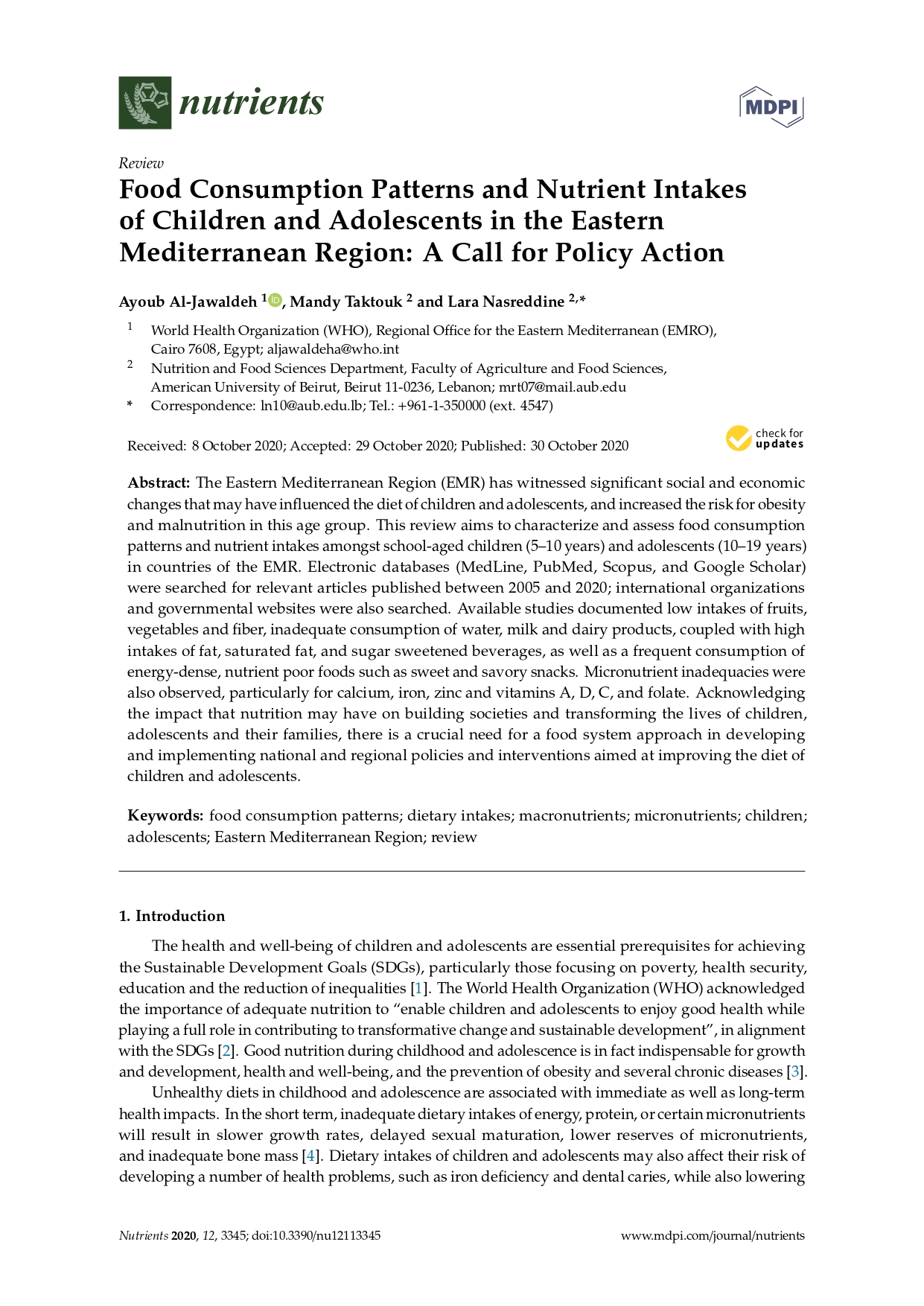
Food consumption patterns and nutrient intakes of children and adolescents in the Eastern Mediterranean Region: a call for policy action
Publication date: 2020
The Eastern Mediterranean Region has witnessed significant social and economic changes that may have influenced the diet of children and adolescents, and increased the risk for obesity and malnutrition in this age group. This review aims to characterize and assess food consumption patterns and nutrient intakes amongst school-aged children (5–10 years) and adolescents (10–19 years) in countries of the Region. Acknowledging the impact that nutrition may have on building societies and transforming the lives of children, adolescents and their families, there is a crucial need for a food system approach in developing and implementing national and regional policies and interventions aimed at improving the diet of children and adolescents.



